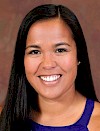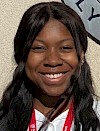AASP Newsletter - March 2021
Diversity Corner: Integrating Inclusive Language Into Your Practice
 Hannah Bennett |
 Brittany Williams |
Brittany Williams, MS, IMG Academy
What Is Inclusive Language?
For many of us, our language tendencies and biases stem from our upbringing, education, and experiences. Therefore, we may be inadvertently perpetuating unfounded stereotypes. In doing so, we might offend or misrepresent a colleague, an athlete with whom we work, or a community. Inclusive language “acknowledges diversity, conveys respect to all people, is sensitive to differences, and promotes equal opportunities” (Linguistic Society of America, 2016). People using inclusive language work to avoid unintentionally marginalizing or demeaning individuals or communities. Examples of identities and categories where inclusive language is imperative might be age, class, ability, gender identity, sexual orientation, power-based interpersonal violence, race, ethnicity, religion, and size (Rider University, n.d.).
Why Inclusive Language Is Important in Your Practice
Using inclusive language shows our athletes, coaches, and support staff that their individuality matters, is important, and valued. Inclusive language acknowledges and brings awareness to all parts of our clients’ identities. Intentionally integrating inclusive language demonstrates that we are responsive and responsible practitioners.
How to Incorporate Inclusive Language
The overall mission is to increase our own awareness and integrate this language in both life and practice. Here are four ways to integrate inclusive language into your life and work:
- Acknowledge your biases.
- Take a moment to reflect on your current language usage. Critique your biases and take ownership of the internal work that might need to be done. We encourage you to check out this resource on Implicit Bias Training.
- Some questions to ask yourself: Do I automatically use binary identifiers (him/her) when addressing my athletes? Do I only use the word “church” to signify any place of worship? How have my experiences impacted my language use? How do I perpetuate systemically exclusive language in both my life and my consulting?
- Take time to educate yourself.
- Spend time actively learning about ways to disrupt your current language habits.
- Learn definitions. Check out the Human Rights Campaign Glossary of Terms to start.
- Watch documentaries. A few great ones to get you started: 13th (Netflix), Transhood (HBO), and Gender Revolution (Disney+).
- Read peer-reviewed articles and other books. Here are a few resources: "Understanding the experiences of LGBT athletes in sport: A multilevel model, ‘Race,’ ethnicity and racism in sports coaching," and "Working with religious and spiritual athletes: Ethical considerations for sport psychologists."
- Follow educational and informative social media handles. Some of our favorites: Jen Fry Talks, Indigenous Peoples Movement, The Conscious Kid, and Chris Mosier.
- Listen to informative podcasts: The LGBT Sport Podcast, All My Relations, Show About Race, The Body Image Podcast, or Disability Visibility.
- Inclusive language extends beyond one community and resources should be examined for many different communities and people.
- Spend time actively learning about ways to disrupt your current language habits.
- Start small.
- If this work is new to you, we encourage you to start small. Small changes can be extremely significant to you and those around you. For example, if your coach is encouraging athletes to bring a significant other to an end-of-the-year banquet, encourage them to use “significant other” or “partner” in the invites instead of using the binary “boyfriend/girlfriend.” A second example could be to replace outdated and commonly offensive ethnic descriptors or phrases such as “Orientals” by using accurate ethnic identifiers such as Vietnamese, Korean, Filipino, etc. Finally, you could include your pronouns during introductions with new teams or coaches and on your e-mail signature; and include the option for clients to add their pronouns on consent forms and other consulting documents.
- Be okay with making mistakes in the learning process.
- It is arguably more important to continue growing by making mistakes and learning from them than it is to avoid hard conversations because you are afraid or not ready. You will mess up. When you do, accept responsibility, correct yourself, and keep working on it. We are all a work in progress.
References
- Linguistic Society of America. (2016, November). Guidelines for inclusive language. https://www.linguisticsociety.org/resource/guidelines-inclusive-language
- Rider University. (n.d.). Using inclusive language: Guidelines and Examples. https://online.rider.edu/online-bachelors-degrees/liberal-studies/guide-to-using-inclusive-language/



